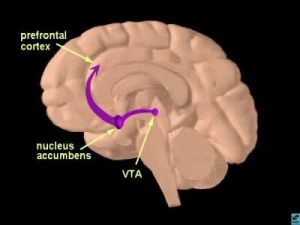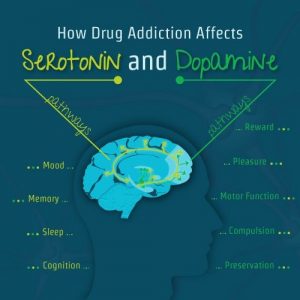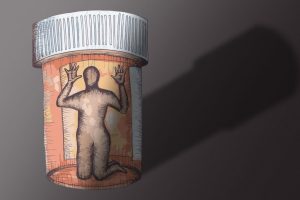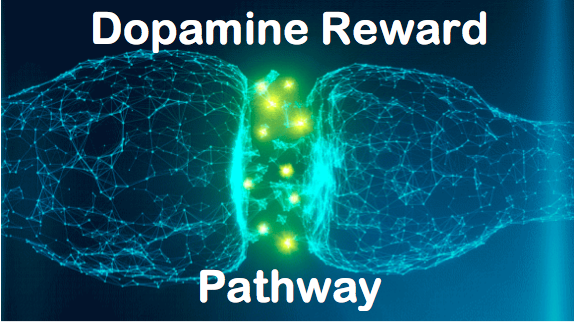As humans, we are driven to do what makes us feel good and those feelings are produced by chemical signals in our brain. We are trained to repeat experiences that produce reward but this pathway is susceptible to takeover by drugs that produce large euphoric feelings. With this chemical groundwork, drug addiction can permanently override the reward signaling in our brains, causing everyday activities that would make us feel good to pale in comparison to the unnatural high.
The Reward Pathway
 The human brain is capable of many complex memories and emotions all driven by chemical interactions and signaling in distinct brain regions. In response to experiences like eating food, sleeping, or having sex a portion of the brain called the reward pathway is activated. This pathway creates lasting memories connecting certain activities with the feeling of reward and encouraging repetition of the behaviors. Activation of this pathway takes place in the ventral tegmental area (VTA) which projects to the nucleus accumbens (NAc), with signals propagated by the release of the neurotransmitter dopamine. Dopamine creates the feelings of euphoria and energy and function to remind our brains to do things that help us survive.
The human brain is capable of many complex memories and emotions all driven by chemical interactions and signaling in distinct brain regions. In response to experiences like eating food, sleeping, or having sex a portion of the brain called the reward pathway is activated. This pathway creates lasting memories connecting certain activities with the feeling of reward and encouraging repetition of the behaviors. Activation of this pathway takes place in the ventral tegmental area (VTA) which projects to the nucleus accumbens (NAc), with signals propagated by the release of the neurotransmitter dopamine. Dopamine creates the feelings of euphoria and energy and function to remind our brains to do things that help us survive.
Overthrown Reward Pathway: Drugs
 However, when addictive drugs are involved in this brain circuitry and dopamine levels are unnaturally raised the reward pathway is overthrown. A large euphoric high along with the connection of drug using behaviors with the reward leads to what we know as addiction and drug seeking behaviors. Addictive drugs act in different ways in the brain, but all function to make more dopamine available to activate the neurons in the NAc and signaling to the frontal cortex.
However, when addictive drugs are involved in this brain circuitry and dopamine levels are unnaturally raised the reward pathway is overthrown. A large euphoric high along with the connection of drug using behaviors with the reward leads to what we know as addiction and drug seeking behaviors. Addictive drugs act in different ways in the brain, but all function to make more dopamine available to activate the neurons in the NAc and signaling to the frontal cortex.
Addiction and Stress
 The stress pathway can add to the dopamine levels in the reward pathway and compound drug-seeking behaviors in addiction. The release of dopamine driven by glucocorticoid hormones functions to increase the euphoric sense and desire to return to the behavior triggering the reaction. In an experiment done on rats addicted to cocaine, after being given a small amount of cocaine as a trigger, rats with excess stress hormones or an external stressor showed more signs of relapse than those that did not have increased stress levels.
The stress pathway can add to the dopamine levels in the reward pathway and compound drug-seeking behaviors in addiction. The release of dopamine driven by glucocorticoid hormones functions to increase the euphoric sense and desire to return to the behavior triggering the reaction. In an experiment done on rats addicted to cocaine, after being given a small amount of cocaine as a trigger, rats with excess stress hormones or an external stressor showed more signs of relapse than those that did not have increased stress levels.
For further research
- https://www.drugabuse.gov/publications/teaching-packets/understanding-drug-abuse-addiction/section-i/4-reward-pathway
- https://www.youtube.com/watch?v=ukFjH9odsXw
- https://www.youtube.com/watch?v=aqhzFd4NUPI
- https://learn.genetics.utah.edu/content/addiction/rewardbehavior/
Images
- http://evolver.fm/2013/04/12/theres-a-part-of-the-brain-for-buying-music-heres-how-it-works/
- https://www.rehabcenter.net/how-drug-addiction-affects-serotonin-and-dopamine/
- http://mcgovern.mit.edu/news/news/new-sensors-track-dopamine-in-the-brain-for-more-than-year/
